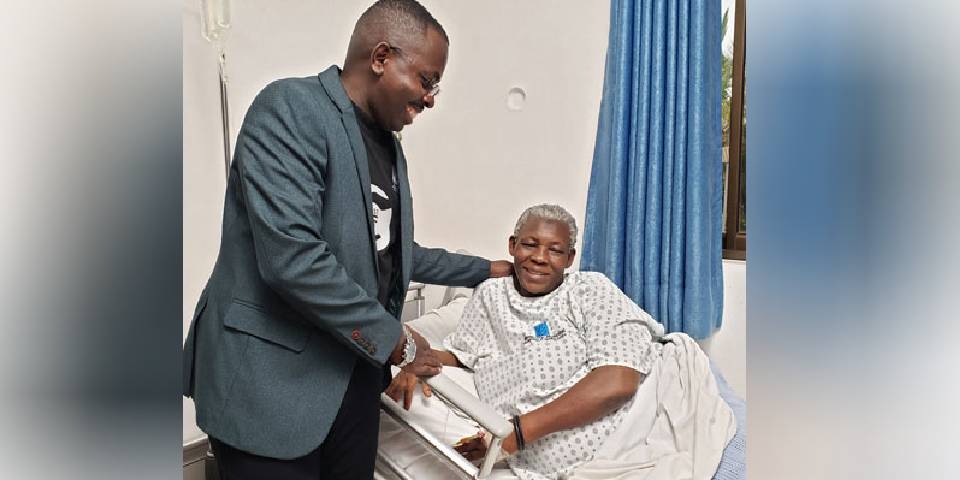70-year-old Ugandan granny gives birth to twins

Ms Safiina Namukwaya, a resident of Masaka District, Uganda, talks to Mr Arthur Matsiko of the Women’s Hospital International Fertility Centre, in Kampala on November 29, 2023.
What you need to know:
- Mrs Namukwaya's husband died in 1992.
- She had suffered a miscarriage during the marriage.
- Four years after her husband's death, she entered into another relationship but was still unable to bear children.
A 70-year-old Ugandan woman has given birth to twins. Ms Safiina Namukwaya, a resident of Masaka District, was conceived through In Vitro Fertilisation (IVF) performed by Dr Edward Sali at the Women's Hospital International Fertility Centre.
In an interview with the Monitor on Wednesday before going into the labour ward, Ms Namukwaya said: "A miracle is going to happen here today (Wednesday). I was brought here by a friend who assured me that after waiting for a long time, I will have a child.
She said that carrying twins (a boy and a girl) at her age was not her cup of tea.
Biologically, women go into menopause between the ages of 45 and 55. The World Health Organisation describes menopause as "one point in a continuum of life stages for women, marking the end of their reproductive years".
"There was a time when I was very ill because of the pregnancy, I spent almost all my savings. I went to a hospital in Kyabakuza and later called Dr Sali. He told me to travel to Kampala, but I told him I had no money and he organised transport to the hospital," she said, adding that her partner has since abandoned her.
"Men don't like to be told that a woman is carrying more than one baby. Since I came here, my partner has never shown up. Dr Sali has taken care of everything," she said.
Ms Namukwaya said she decided to get pregnant after being insulted for being childless.
"I looked after other people's children and saw them grow up and leave me alone. I wondered who would take care of me when I grow old. Once, a very young boy mocked me, saying my mother had cursed me to die without a child," she added.
Mrs Namukwaya's husband died in 1992. She had suffered a miscarriage during the marriage. Four years after her husband's death, she entered into another relationship but was still unable to bear children.
When asked about her readiness to take care of the babies, she said: "I really don't know, God is in charge. You see, you can have one child and feel overwhelmed, but here I am with twins at a time when I'm weak, a time when I can't go to my garden to grow food to sell, I don't know!... But they say every child comes with its blessings.
Ms Namukwaya has a daughter born in 2020.
After about 40 minutes of chatting, the nurses came to take her to the labour room. She walked sluggishly as the nurse kept asking her how she was feeling.
Read: Men inside labour wards
Dr Sali says age is just a number in the face of advanced technology.
"She is not the first. In the last 15 years, we have delivered more than 60 patients over the age of 50. Ms Safiina came here three years ago at the age of 67 and told me she had been married for 40 years and wanted a baby. So I said, look, you're younger than Sarah in the Bible (who gave birth at 90), so it's possible," he said.
"She was fit and she had her first baby at 67. So she came back this year and asked to have another child. We examined her and she was fit. Assessment means checking blood pressure and doing tests for liver and kidney function," Dr Sali added.
"We usually check blood pressure, diabetes and infections to reduce any complications that may arise," he added.
As for breastfeeding, the fertility specialist said this should be the least of a mother's worries.
"Any woman can breastfeed as long as you put a baby on the breast to stimulate the process. Breast milk will come within seven days. We also have other options like breast milk donors and formula milk for babies," he said.
He added that pregnancies at such an advanced age are not common because of the natural decline in fertility and increased health risks. Ms Namukwaya gave birth at 34 weeks.
"Complications in pregnancy after 32 weeks are usually fatal, so we decided to keep her close for monitoring, but she was also complaining of breathing difficulties. We wanted to make sure we didn't get into a situation where she couldn't breathe," the doctor said.
He added: "Normally, at her age, she can carry up to 5kg and both babies are about 2kg each, so when you add the placenta and the uterus, it is about the weight."
A health worker at the facility said the babies would be in the neonatal intensive care unit for a few days, but "we expect the mother to be out of here within a week. She should be walking around by tomorrow (Thursday). We will make sure she gets good care, especially in terms of nutrition.
Infertility, says Dr Sali, is the main reason why people opt for assisted procedures such as IVF.





